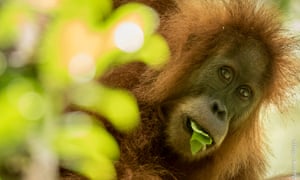Extract from The Guardian
Zoos Victoria made the decision after Nestlé lost its sustainable certification
Products from the food and drink giant Nestlé will no longer be stocked at the stores and food carts at Melbourne and Werribee zoos.
Zoos Victoria made the decision after the Roundtable on Sustainable Palm Oil (RSPO) suspended Nestlé’s membership when the company failed to submit a 2016 progress report, and its 2017 report lacked a timetable for producing or buying certified sustainable palm oil.
“Nestlé was given the opportunity to complete its annual communications of progress report for 2017 through active engagement, and has declined to submit a time-bound plan,” a statement from RSPO said.
It means Nestlé will no longer be able to claim to be an RSPO member or that its products contain certified sustainable palm oil.
A Nestlé spokeswoman said the company was “disappointed” by the suspension and by the response of Zoos Victoria.
“Absolutely nothing has changed for our products: we are continuing to use exactly the same palm oil ingredients from the same RSPO certified supply chains,” she said.
“Any palm oil in Nestlé products sold at zoos in Victoria is sustainably sourced. We’re disappointed that our RSPO membership has been suspended. We’re talking to the RSPO and hope to requalify in the coming days.”
The spokeswoman said RSPO certification was important to holding the palm oil sector to account.
“While our approaches differ, we believe that the sector will be stronger if we work together,” she said.
Zoos Victoria’s director of wildlife conservation and science, Rachel Lowry, said the zoo’s stance was clear.
“The only palm oil we sell is from companies who source only 100% certified sustainable palm oil through the RSPO,” she said.
“We will continue to keep our zoo shelves clear of Nestlé products until they take the necessary steps to comply with the RSPO standards, for we remain confident this is the best and most reliable way that we, as an organisation committed to fighting wildlife extinction, can guarantee that the food that we are selling across our zoos is not contributing to the loss of wildlife such as orangutans and Sumatran tigers abroad.”
An analysis published in June by the International Union for Conservation of Nature found palm oil was damaging global biodiversity, affecting 193 threatened species.
“Certified palm oil has so far proven to be only marginally better in terms of preventing deforestation than its non-certified equivalent, but the approach is relatively new and holds potential for improving sustainability,” the IUCN said in a statement. “More efforts are needed to ensure that sustainability commitments are honoured and that their reporting is transparent, but also that there remains a demand for certified palm oil.”
Zoos Victoria made the decision after the Roundtable on Sustainable Palm Oil (RSPO) suspended Nestlé’s membership when the company failed to submit a 2016 progress report, and its 2017 report lacked a timetable for producing or buying certified sustainable palm oil.
“Nestlé was given the opportunity to complete its annual communications of progress report for 2017 through active engagement, and has declined to submit a time-bound plan,” a statement from RSPO said.
It means Nestlé will no longer be able to claim to be an RSPO member or that its products contain certified sustainable palm oil.
A Nestlé spokeswoman said the company was “disappointed” by the suspension and by the response of Zoos Victoria.
“Absolutely nothing has changed for our products: we are continuing to use exactly the same palm oil ingredients from the same RSPO certified supply chains,” she said.
“Any palm oil in Nestlé products sold at zoos in Victoria is sustainably sourced. We’re disappointed that our RSPO membership has been suspended. We’re talking to the RSPO and hope to requalify in the coming days.”
The spokeswoman said RSPO certification was important to holding the palm oil sector to account.
“While our approaches differ, we believe that the sector will be stronger if we work together,” she said.
Zoos Victoria’s director of wildlife conservation and science, Rachel Lowry, said the zoo’s stance was clear.
“The only palm oil we sell is from companies who source only 100% certified sustainable palm oil through the RSPO,” she said.
“We will continue to keep our zoo shelves clear of Nestlé products until they take the necessary steps to comply with the RSPO standards, for we remain confident this is the best and most reliable way that we, as an organisation committed to fighting wildlife extinction, can guarantee that the food that we are selling across our zoos is not contributing to the loss of wildlife such as orangutans and Sumatran tigers abroad.”
An analysis published in June by the International Union for Conservation of Nature found palm oil was damaging global biodiversity, affecting 193 threatened species.
“Certified palm oil has so far proven to be only marginally better in terms of preventing deforestation than its non-certified equivalent, but the approach is relatively new and holds potential for improving sustainability,” the IUCN said in a statement. “More efforts are needed to ensure that sustainability commitments are honoured and that their reporting is transparent, but also that there remains a demand for certified palm oil.”

No comments:
Post a Comment